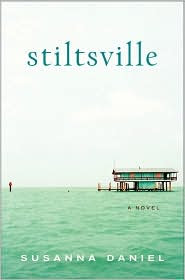 Susanna Daniel was born and raised in Miami, Florida, where she spent much of her childhood at her family’s stilt house in Biscayne Bay. She is a graduate of Columbia University and the University of Iowa Writers’ Workshop, and was a Carl Djerassi Fiction Fellow at the University of Wisconsin Institute for Creative Writing.
Susanna Daniel was born and raised in Miami, Florida, where she spent much of her childhood at her family’s stilt house in Biscayne Bay. She is a graduate of Columbia University and the University of Iowa Writers’ Workshop, and was a Carl Djerassi Fiction Fellow at the University of Wisconsin Institute for Creative Writing.Her stories have been published in Harcourt’s Best New American Voices Anthology, One Story, Epoch, The Madison Review, and SignificantObjects.com.
She applied the Page 69 Test to Stiltsville, her first novel, and reported the following:
Stiltsville spans three decades and is structured into seven sections, each of which covers a pivotal moment in the narrator's marriage and South Florida history. The intervening years are telescoped at the start and end of each chapter. Page 69 covers the years between the second chapter (in which the narrator falls in love) and the third chapter (in which the narrator first recognizes the fragility of her own marriage).Learn more about the book and author at Susanna Daniel's website and blog.We married in Atlanta, in the Baptist church I'd attended as a child ... Back in Miami, Dennis's parents threw us a reception at their yacht club, and then we spent a week in the Keys, hopping from island to island in his father's boat and camping on the shallow beaches. One night we woke to the sight of hundreds of glowing anemones drifting by. In the morning, dozens had washed ashore and lay sickly at the foot of our tent ... We had a little girl and named her Margo, ostensibly after Dennis's grandmother but really because I loved the name: I thought it was earthy and wise and unmistakably South Floridian.Stiltsville is a fictional memoir of a basically -- but not purely -- successful marriage, which did not turn out to be what the narrator had imagined for herself. Throughout the years, the characters are forced to readjust their expectations, of each other and themselves and their surroundings, in order to move forward. This page represents the novel in the way it encapsulates the narrator's wedding (and, later on the page, the chaotic years of new parenthood), leaving the remainder of the chapter to focus, in scene and dialogue, on the messier and less predictable moments of life.
Though the page doesn't touch on the main themes of the novel, it does represent the way Stiltsville handles time, expanding and contracting it the way a memoir does, always with a focus on the details that enriched the experience of an event.
Check out the complete list of books in the Page 69 Test Series.
--Marshal Zeringue